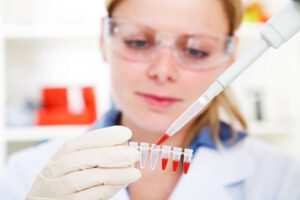
Polymerase Chain Reaction, better known as PCR, is a test that identifies specific genetic fragments for the diagnosis of genetic disorders.
PCR tests are considered effective and fast. These accurate tests use genetic sequencing to diagnose genetic disorders. PCR testing has other uses aside from genetic testing, such as identifying certain infectious diseases.
In genetic screening, PCR is recommended when the genetic mutation causing the disorder is already known and there is a high risk of the specific disease. For this reason, PCR is usually not included in general prenatal screen testing for detecting genetic disorders but is mainly used for diagnosing or eliminating a specific disease.
When is the test needed?
PCR testing is recommended in cases of a risk for a certain genetic disorder. Since this test can identify specific genetic mutations, it can only be used when the mutation causing the disease is already known. Most mutation responsible for genetic disorders are known, so PCR can be used to detect these specific diseases.
Unlike karyotype and FISH tests that identify “large” changes in the chromosomes, PCR testing detects specific mutations and diagnoses specific genetic disorders accordingly.
Who should undergo the test?
PCR tests are used for accurately diagnosing genetic diseases and in cases of a risk for a genetic disorder (for detecting specific mutations). It is helpful mainly in the following cases:
Before PGD
Couples in a high risk of genetic diseases undergo a procedure known as Pre-implantation Genetic Diagnosis (PGD) as part of the in-vitro fertilization process. The PGD method can detect genetic disorders before the embryo is transferred to the uterus.
This test is recommended to those with a family history of genetic disorders, after the birth of a child with a genetic disorder or in cases of intermarriage that can increase the risk for genetic disorders.
In these cases, a sample is taken from the retrieved eggs. The eggs undergo a PCR test that can identify the different mutations that may cause the genetic disease. If none of those mutations were passed on to the embryo, it will probably not suffer from the tested disease. The embryo can then be returned to the uterus for the beginning of the pregnancy.
Genetic screening tests
PCR tests are used today for identifying genetic mutations as part of screen testing for common genetic disorders. The test can accurately detect these diseases and identify if the parents are carriers.
For purposes non-related to genetic screening
In addition to PCR’s important role in genetic screen testing, this method is also useful for identifying different infectious diseases. In these cases, the lab receives DNA samples taken from a biopsy or body fluids. The lab then looks for typical genetic sequences that can help identify viruses and infections, without the need for a viral culture.
How does the test work?
In PCR testing, the DNA is amplified (copied) according to the mutations being tested. The test uses samples from amniocentesis or CVS (in prenatal testing), or from body fluids (in children or adults).
After the genetic material is drawn from the cells, special probes (small segments containing the unique genetic sequence needed) are used. If results show a match, the segments (also called primers), attach to the DNA sequence and are copied by adding an enzyme named polymerase.
This is a complex and precise technique; results are available shortly and thanks to the precision of the test, it allows an accurate diagnosis of genetic disorders.
What diseases can the test detect?
The PCR test can detect many different genetic diseases, what these diseases have in common is that the mutation causing them is known. The test can be used to detect diseases such as Gaucher’s disease, Angelman syndrome, DiGeorge syndrome, Prader-Willi syndrome and more genetic diseases.
In addition to genetic disorders, PCR tests identify certain infectious diseases and help determine the prognosis of malignant diseases. It is important to note that PCR tests cannot be used without knowing which disease is being looked for.
Only after a clinical suspicion for a certain disease has been found can the PCR test be planned to look for the specific genetic mutation that causes that disease.

